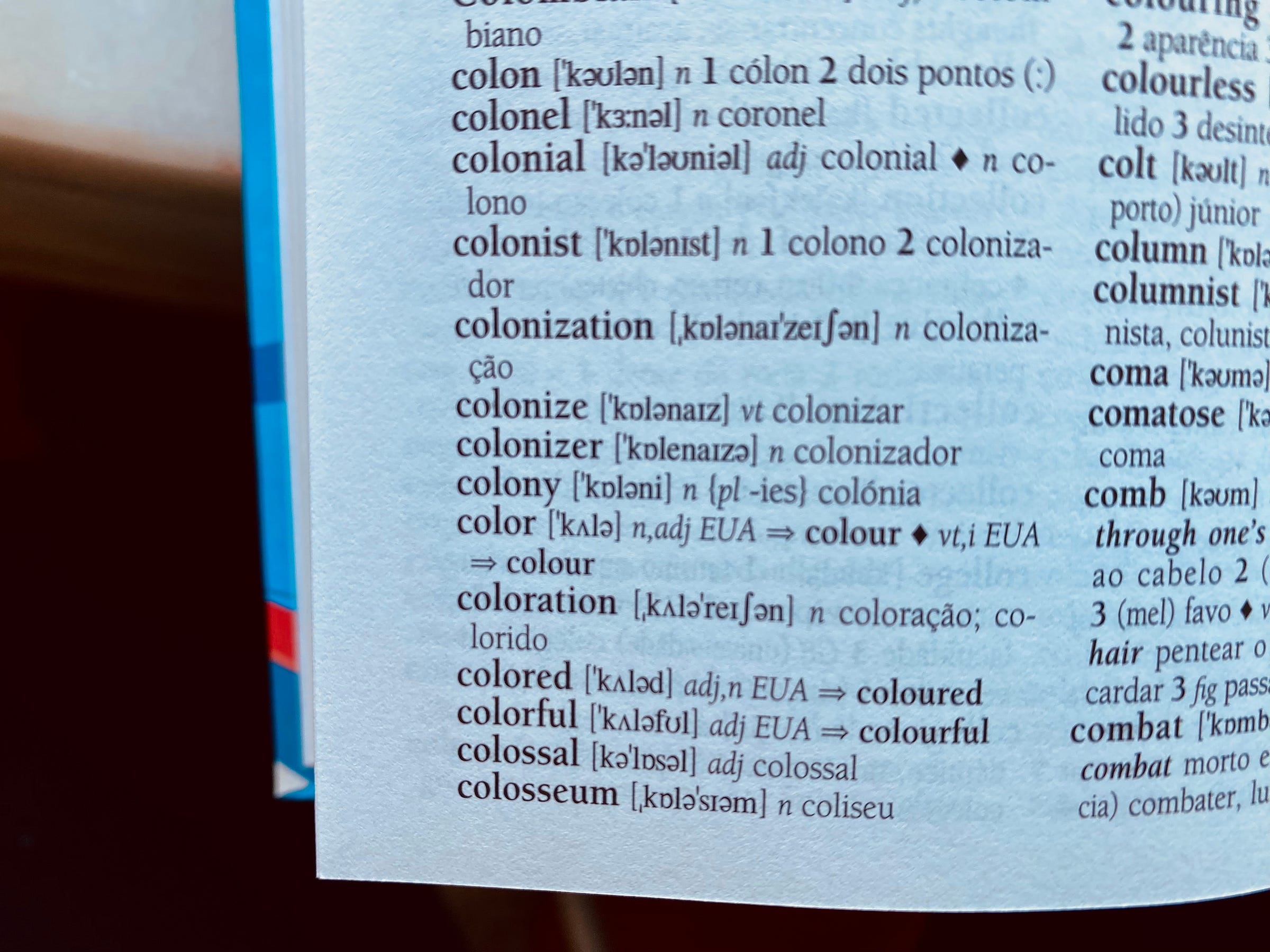If it’s happened once, it’s happened mil vezes in the grocery store, the post office, the car repair shop, the dentist, out for dinner: I’ll begin with my oft-practiced Portuguese opener: Peço desculpa, mas não falo muito bem português. (I’m sorry, I don’t speak Portuguese very well.) I’m trying to be polite by giving them a heads up that I’m going to mess up their language, probably quite spectacularly, but I’m giving it my best shot.
Then I carry on with some version of: Estou à procura de / Precisa de marcar uma consulta / Gostaria de encomendar... (I'm looking for / I need to make an appointment / I would like to order…)
And that’s where I often stop, not because I haven’t practiced whatever words I need to say next, but because I’m interrupted by the kindly cashier / secretary / waiter who says, Is English better for you?
Try as I might to carry on, my shoulders will sag in relief. Even if I protest that I’m learning (Estou a aprender!) and I want to blunder on, they will wave me away and roll out the English carpet. No matter how much they protest that their English skills are terrible, it’s always far better than my own clumsy efforts falar português.
Because English is everywhere. Maybe not literally everywhere, but everywhere enough.
English is spoken by 1.35 billion people—20% of the world. It’s the most commonly learned language, too. English is a mother tongue to 370 million folks, but there are 898 million other people who have learned the language and can speak it fluently.
For native English speakers, this means we can slide by on a few paltry phrases in most of the countries in which we travel (or relocate to): Hello. Please. Thank you. How much? Goodbye.
I’m not yelling at you. I’m lazy when it comes to language learning, too. I don’t intend to be, but I am. Sometimes I imagine how the tables would turn if I were a Portuguese person who moved to the United States. No one would bother speaking my native language to me there—most Americans have no idea how to even say obrigada. If I were Portuguese, I’d be forced to get fluent just to survive.
Portuguese people of my generation (that’s Gen X, if you’re keeping track) usually tell me they first learned to speak English from American and British movies, TV, and music. None of this entertainment gets overdubbed in Portuguese, so when they go to see the latest Hollywood offering in the theater, they’re listening to the original English dialogue while Portuguese subtitles roll by. Their ears have had years to become accustomed to my native language simply because it is inescapable.
When you ask someone in Portugal, Fala inglês? they will often shake their head vehemently and say, Não, não, my English is very bad! And what they mean by “very bad” is “not perfect.”
But even if they’re too timid to lay their English cards on the table, they can understand your English and thus absolve you of the need to fala português.
Younger generations are learning English in elementary school now instead of French. And once students get to 3º ciclo (the equivalent of middle school), they’re usually learning Spanish as well.
By contrast, I never heard Portuguese until I moved to Portugal. I’ve never needed subtitles on my movies because most anything I want to watch (anywhere I want to watch it) is available in my mother tongue. Same goes for TV shows, music, books.
I grew up in small town mid-America in the late 20th century when learning another language was a weird thing to do. There was a mandatory Spanish class in high school and two years of French in college that landed me in Paris 15 years later barely able to stammer: Bonjour, je cherche du vernis à ongles noir? in the Chanel store. (It didn’t matter anyway because the salesperson interrupted me in flawless English.)
Even when I’ve traveled further afield—Vietnam, India, Morocco—it hasn’t been hard to find my way in English. Nearly everywhere you go there’s an English option or a guide fluent in five different languages who’s eager to practice their American slang.
But when Portuguese people visit Germany or Italy or Canada or even neighboring Spain, they can’t expect people to understand or speak to them in their native tongue. They have to try harder.
English speakers don’t have to.
So we don’t.
We colonizers tend to sail through the world oblivious of all the ways we have bent it to our will and molded it in our image. This place has been our oyster for so very long, we don’t even notice the way we hold out a hand expecting everyone to hand over a pearl.
And sure, Portugal had its own turn as the world’s greatest colonizer. Pretty sure they wouldn’t be greeting each other with bom dia right now in Angola, Mozambique, Macau, Cabo Verde, Guinea-Bissau, São Tomé, Príncipe, East Timor, Madeira, the Azores, or Brazil if it weren’t for the long and grasping reach of the mighty Portuguese empire.
But these days (some) people (a lot, actually) think Lisbon is a city in Spain and Portugal is a country in South America. These days it’s the English speakers who act like they’ve inherited the earth.
Look, I acknowledge that I myself am colonizer stock, white and middle class out here prying my very own personal pearl from the red clay of the Palmela countryside. (Oysters can’t survive in clay, I don’t know what I’m doing with this metaphor anymore.) I’m a pot pointing fingers at the kettle. I’m barely scratching the surface of A2 Portuguese after nearly three years in country.
(Absolutely relevant and very brief rabbit trail: Last summer, I met a French woman in Setúbal and we were chatting about the weather and our kids and language learning and she said casually, waving her hand as if brushing a fly from her face, “Oh yes, well my boys and I are getting on well in Portuguese—we’ve been here almost a year already, so of course we’re nearly fluent.” And I was like *gulp* “Oh, uh-huh!” *weak laugh* “Of course.” Also, my Dutch neighbors speak: 1. Dutch (naturally) 2. English 3. Portuguese 4. German 5. French 6. Oh, and “some” Spanish 7. And a “little bit” of Italian. And yet earlier this week one of them apologized to me because he couldn’t remember the English word for “slippery.”)
I’m well aware of my own shortcomings when it comes to learning and speaking languages other than my own. It’s a regret I am daily seeking to remedy. Along the way, though, I’m doing a whole hell of a lot of decolonizing my own thinking—recognizing my own privilege is just the first step. Disentangling myself from my very American, capitalist, imperialist programming is a process which will no doubt last the rest of my life.
Learning Portuguese feels like an essential part of this deconstruction, another way to open my eyes and see the world from an entirely different point of view.
If you want to support my work…
you can choose from a couple of tiers of paid subscriptions. In addition to my undying gratitude, you’ll get more of my writing, which is what (I assume) you’re here for! Once a month for paid subscribers only, I will post an excerpt from my memoir-in-progress. The first one is here, for free, if you want a preview.
OR
If you’re not into paid subscriptions, but you’d still like to show support, you can always leave me a tip. If you want to carry on reading these posts for free because you can’t or shan’t pay, that’s perfectly fine. I do not hide Long Scrawl essays behind a paywall.
NO MATTER WHAT, thank you for reading. And thank you for telling me when my writing means something to you. That matters most of all.
Copyright © 2024 LaDonna Witmer








First, a great thank you to LaDonna for having the opportunity to read your writing. It's all so beautiful, the writing, the ideas, the metaphors, all! Second, I'm sharing two thoughts. 1. Being portuguese (and speaking Portuguese - of course -, and English, and French; being B1 in German, Italian and Spanish, and loving languages in general) I do resent a bit when people say quite "naturally", and without thinking: "Portuguese is a terribly difficult language to learn", just because I compare. I can't help it. I compare things to enable reflection on them. Even from the English point of view, I can't help thinking about Polish, Hungarian, Finnish, Danish, etc., not even considering oriental languages, that have completely different grammatical structures and concepts. Language is an essential component of culture. The foreigner's "bubble thing" is real. And the turning tables image is very, very real. Only through the force of numbers a foreigner gets help in your (foreign) language - see Spanish in the USA, or English in the Algarve, South of France, etc. Imagine me moving to Greece, without basic English or French. Imagine me moving to the UK... This leads me to the "immersion thing", but in the (real, common) rough way: You're not an expat with financial means. You can not choose fancy neighborhoods to live in. You struggle to move to point A to point B. You HAVE to work (and you can not choose the job you've learned, but just accept the jobs you get - that don't imply talking to natives), you have to swim in the muddy, thick waters of bureaucracy, and when you're ill, you're unable to explain where it hurts, what you really feel! At first you can not communicate, you're alone. But you made a life choice and you need to make it work. So you learn the language the hard way. BUT you learn. You'll never be fluent like a native, you'll never lose your accent. You'll just get more aware that the more you know the more you find there is to learn. Sooooo... I must be sensible with my statements and my comparisons, reflection and empathy are a must. 2. The speakers of a foreign language who speak your own have a huge advantage. They "know" two systems, and they can navigate in different grammars and concepts. In the end, foreigners that struggle/want to learn are admired and respected, even when they fail, even when they make mistakes. Those who despise the learning part (there are such people, unfortunately, that gave up or just decided that they don't have/need to) lose a great learning/cultural opportunity that enriches us as people.
Once again, thanks for your insightful writing. I chuckled at your opening line, I have practiced the exact phrase myself and used it less than 10 times while traveling in Portugal mainly for the same reasons. My best Portuguese is much worse than most Portuguese peoples English so I default back to English. I am moving in May and have feverishly been trying to learn enough to have a basic conversation. I took Latin in highschool which isn’t a spoken language so I am learning my first new language now as a retired person. But here is the rub. I grew up in the 60’s where being foreign was not cool. My father is from Czechoslovakia and spoke 4 languages fluently, my mother is first generation with her father from Greece and she spoke 3 languages. So in my home I could have learned my choice of 7 languages but learned none of them. I am absolutely not going to default to English and I will keep apologizing before I butcher my next sentence in Portuguese but it is so important to me.